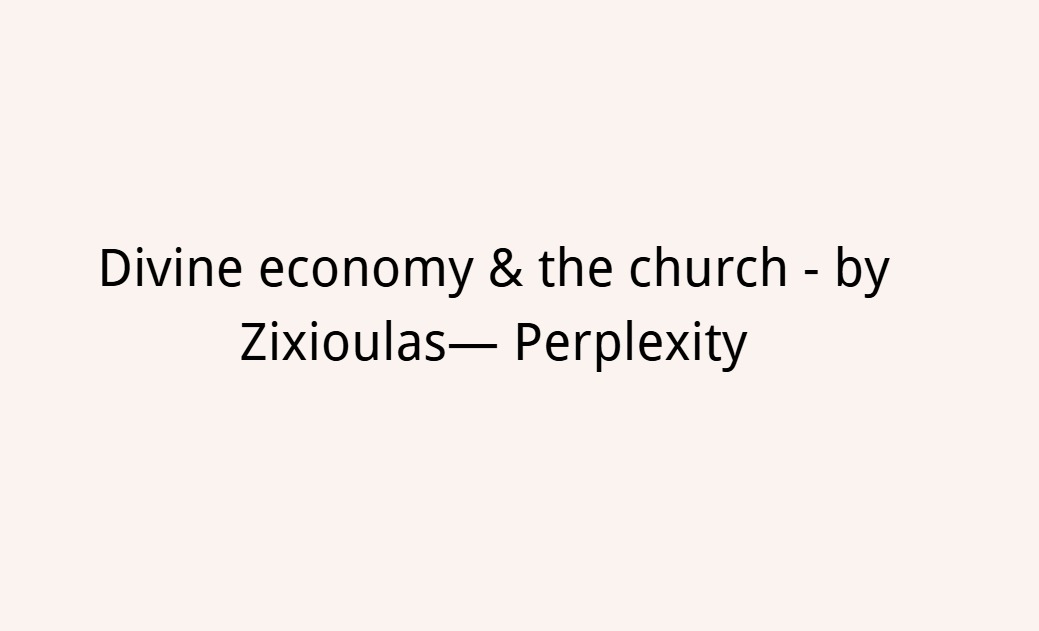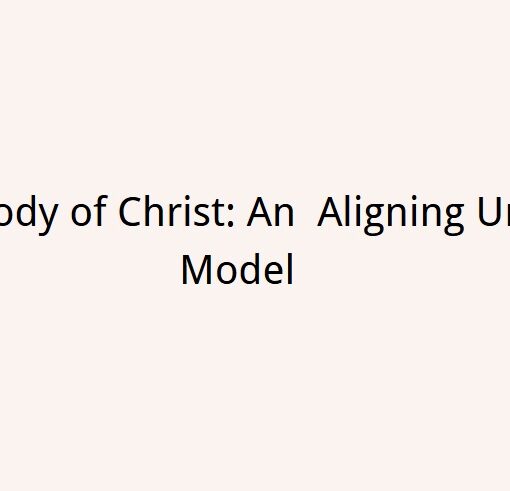In Zizioulas’ theological framework, the relationship between **divine economy** and the Church forms the core foundation of ecclesiology. For him, these two concepts are inseparably linked, with the Church emerging as both the concrete expression and ultimate goal of God’s salvific plan.
## Divine Economy as God’s Relational Plan
The term **oikonomia** (economy) in Zizioulas’ thought refers to God’s household administration—His eternal plan to dispense Himself into creation through the work of the Trinity[1][2]. This divine economy is not simply God’s external management of the world, but represents His desire to share His own relational, communal life with creation[3][4].
Zizioulas emphasizes that this economy is fundamentally **Trinitarian in structure**[5]. The divine economy operates through what he calls the “double divine economy”: the work of Jesus Christ and the work of the Holy Spirit[5]. The economy is not merely about salvation from sin, but about God’s intention to transform humanity into communion—the very mode of existence that characterizes the Trinity itself.
## The Church as Economy’s Embodiment
For Zizioulas, **the Church is not merely the recipient of divine economy but its concrete realization**[4]. The Church emerges as the space where God’s plan of communion becomes historically present and experienced. This means the Church isn’t an institution added to individual believers, but represents the very form that divine economy takes in the world.
The relationship works in two directions:
– **Economy creates Church**: God’s salvific plan requires the Church as its embodiment—without the ecclesial community, the divine economy remains abstract[3]
– **Church reveals Economy**: The Church makes visible and concrete what God’s relational plan actually looks like when lived out in human community[4]
## Sacramental Mediation
The divine economy becomes present in the Church primarily through **sacramental life**, especially the Eucharist[2]. Through sacramental signs, the fruits of God’s redemptive act are “prolonged in space and time”[2]. The Eucharist particularly serves as the concrete event where the future kingdom breaks into history, making the divine economy experientially accessible to the community[4].
This sacramental dimension means the Church doesn’t simply teach about divine economy—it **performs** it. Each Eucharistic gathering actualizes the communion that is both the Trinity’s internal life and the goal of God’s economic work in the world.
## Eschatological Tension
The relationship between divine economy and Church also operates within an **eschatological framework**[4]. The Church “roots its identity in its future”—it exists as the present anticipation of the fully realized divine economy. This creates a dynamic tension: the Church is both the real presence of divine communion now and the sign pointing toward its complete fulfillment.
The Church thus serves as the “icon” of what the divine economy ultimately seeks to accomplish—the transformation of all creation into the communal mode of existence that reflects the Trinity’s own relational life[5]. Through this lens, ecclesiology becomes not just the study of the Church’s nature, but the exploration of how God’s eternal plan takes concrete, communal form in history.
Sources
[1] Economy of Salvation – Wikipedia https://en.wikipedia.org/wiki/
[2] Economy, Divine | Encyclopedia.com https://www.encyclopedia.com/
[3] THE DIVINE ECONOMY AND ITS ACCOMPLISHMENT https://www.ministrybooks.org/
[4] Introduction, Lectures in Christian Dogmatics – митрополит Иоанн Зизиулас https://azbyka.ru/otechnik/
[5] Leon Siwecki https://czasopisma.uksw.edu.
[6] Reconsidering the place of Christ in Trinitarian mission in the African Divine Church of Kenya https://indieskriflig.org.za/
[7] Theology and the Crisis of Engagement: Essays on the Relationship between Theology and the Social Sciences ed. by Jeff Nowers and Néstor Medina (review) https://www.semanticscholar.
[8] Divine Oeconomy : The role of providence in early-modern economic thought before Adam Smith https://www.semanticscholar.
[9] Book Review: Jesus, Son of Man https://journals.sagepub.com/
[10] Johann Baptist Metz’s Approach to the Church Secularity: A Theology of Connection https://www.jurnalbia.com/
[11] The ontology of men and women’s relationships in contemporary African ecclesiology: Towards a theology of authority-submission in the church http://www.hts.org.za/index.
[12] Theology of Greek-Byzantine Church Fathers as a Specific Way of Philosophical Thinking in an Epistemological Context https://www.mdpi.com/2077-
[13] Church and State: The Promise of Reformed Theology for the Church Today https://uniocc.com/archive/
[14] McKenny, will not only secure Barth a permanent place in the canon of Christian ethics but also moves towards a truly viable alternative to the traditional Augustinian understanding of the relationship between divine https://www.semanticscholar.
[15] God Dwelling in the Clouds: The Dionysian Idea of the Triple Divine Darkness https://www.mdpi.com/2077-
[16] The Divine Economy – by Mark Koyama https://www.markkoyama.com/p/
[17] Drama of the Divine Economy: Creator and Creation in Early … https://www.
[18] Divine Economy: Theology and the Market – Boston University https://www.bu.edu/cpt/
[19] Divine Economy with the Divine Dispensing of the Divine Trinity into … https://agodman.com/divine-
[20] Divine Economy: Theology and the Market – D. Stephen Lon https://www.routledge.com/
[21] Sacramental Exchange: Eschatological Economy and Consumption Ritual https://www.mdpi.com/2077-
[22] Voicing God: Theological Injunction to economic issues https://verbumetecclesia.org.
[23] Contesting the Dynamics of Secular Development: An Ontology of Trinitarian Well-Being as Christian Rationale for Human Well-Being https://www.schoeningh.de/
[24] The Biblical Ethic of Free Market Exchange https://revistamises.org.br/
[25] The Lutheran “convivial economy” as a Christian economic heterodoxy: significance, components, and proposals to the current socio-economic order https://journals.ufs.ac.za/
[26] An Analysis of Economic Wealth of God’s People from Nomadic to Post Exilic Era https://sttintheos.ac.id/e-
[27] The Common Good According to Great Men of Prayer and Economists: Comparisons, Connections, and Inspirations for Economics https://www.mdpi.com/2077-
[28] Economics of Genesis: On the Institutional Economic Deciphering and Reconstruction of the Stories of the Bible https://figshare.com/articles/
[29] The Teaching of the Catholic Church https://zenodo.org/record/
[30] The Spirit of generosity: a new economic dispensation in the wake of Pentecost? https://ojs.reformedjournals.
[31] Topical Bible: Divine Economy https://biblehub.com/topical/
[32] Economy (religion) – Wikipedia https://en.wikipedia.org/wiki/
[33] The Individual and the Church – John Zizioulas Foundation https://zizioulas.org/
[34] Participating in the Divine Economy https://www.
[35] [PDF] Divine Economy: Theology and the Market https://digitalcommons.lmu.
[36] John Zizioulas’ Trinitarian Ecclesiology. | EBSCOhost https://openurl.ebsco.com/
[37] God’s Economy in Patristic Usage | conversant faith https://conversantfaith.com/
[38] Divine Economy: Theology and the Market https://elmhurst.ecampus.com/
[39] John Zizioulas’ Trinitarian Ecclesiology https://www.academia.edu/
[40] The Divine Economy – Christian Science Sentinel https://sentinel.




